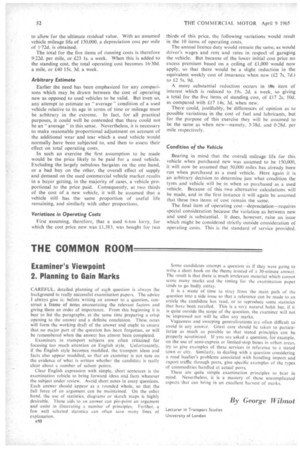THE COMMON ROOM
Page 84

If you've noticed an error in this article please click here to report it so we can fix it.
Examiner's Viewpoint 2. Planning to Gain Marks
CAREFUL, detailed planning of each question is always the background to really successful examination papers. The advice I always give is: before writing an answer to a question, construct a frame of notes enumerating the relevant factors and giving them an order of importance. From this beginning it is best to list the paragraphs, at the same time preparing a crisp opening to the answer and a definite conclusion. These notes will form the working draft of the answer and ought to ensure that no major part of the question has been forgotten, or will be remembered when the answer has almost been completed.
Examiners in transport subjects are often criticized for focusing too much attention on English style. Unfortunately, if the English style becomes muddled, the transport ideas and facts also appear muddled, so that an examiner is not sure on the evidence of what is written whether the candidate is really clear about a number of salient points.
Clear English expression with simple, short sentences is the examination vehicle to bring forward ideas and facts whatever the subject under review. Avoid short notes in essay questions. Each answer should appear as a rounded whole, so that the full force of an argument can be maintained. On the other hand, the use of statistics, diagrams or sketch maps is highly desirable. These aids to an answer can pin-point an argument and assist in illustrating a number of principles. Further, a few well selected statistics can often save many lines of explanation.
n50
Some candidates attempt a question as if they were going to write a short book on the theme instead of a 30-minute answer. The result is that there is much irrelevant material which cannot score many marks and the timing for the examination paper tends to go badly astray.
It is a waste of time to stray from the main path of the question into a side issue so that a reference can be made to an article the candidate has read, or to reproduce some statistics that have been recalled. This is a very natural habit but, if it is quite outside the scope of the question, the examiner will not be impressed nor will he allot any marks.
Vagueness and sweeping generalizations are often difficult to avoid in any answer. Great care should be taken to particularize as much as possible so that stated principles can be properly scrutinized. If you are asked a question, for example, on the use of semi-express or limited-stop buses in urban areas, try to give examples of these services in reference to a stated town or city. Similarly, in dealing with a question considering a road hatflier's problems associated with handling import and export traffic through ports, give specific examples of the types of commodities handled at actual ports.
These are quite simple examination principles to bear in mind. Nevertheless, it is a mastery of these uncomplicated aspects that can bring in an excellent harvest of marks.
By George Wilmot




































































































































